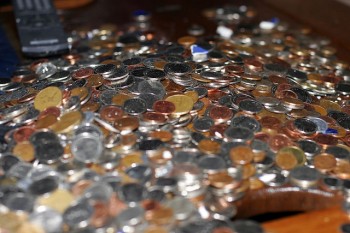
In North America, it’s pretty easy to get by without carrying much cash around. For the most part I pay for all my smaller purchases with debit these days. If I have a larger purchase to make, I generally use my credit card to accumulate some points.
But outside of North America and Europe, it’s been my experience that cash is generally still king. And while having a credit card is great for emergencies (such as being able to get a hotel or a flight in a pinch), I generally make a run to an ATM machine once a week and pull out enough cash to get me by.
Local currency is best for obvious reasons, but it also helps to carry some foreign cash as well. In most places I’ve been to, many establishments will usually accept either US dollars or the Euro as well as local currency, so it’s good to have a stash of either of those.
For example, one time in Buenos Aires (a city where nobody really understands why things happen the way they do, especially when government is concerned) the banks all decided to shut down for a few days while the ATM machines were restocked within the city. That basically meant I was unable to obtain cash for a few days. Because I had some US dollars in my safe, I simply went down to the local supermarket and paid using that. So having a fall-back currency is definitely a good idea to have while traveling.
I usually bring no more than a few hundred dollars of foreign currency, previously US dollars, but I will probably be bring some Euros this time around (since the US dollar seems a bit fragile lately). And while I mostly leave the majority of it stashed in an in-room safe, I generally keep $100 or so of foreign cash on me just for emergency purposes.


When we went down to Costa Rica, they did prefer US currency so we kept that on hand. The bad part was you always got their currency back in change which is good if you can spend it all down there, but useless when you bring it back with you as we were told no banks would exchange it up here.
We do typically take down US currency to places we have been too and will probably look to see if US is wanted over in SE Asia as well. We also try to not keep all of our money pooled in one spot. I have been known to keep money in my socks (while wearing them) 😉 lol
What will you be taking with you to Thailand?
That’s a good question, and I’m not entirely sure yet. I arrived in Buenos Aires with $2,500 USD, mostly because I had to leave a one month damage deposit on my apartment and also pay the first month in rent up front. I don’t currently have accommodation in Koh Samui, and I’m not sure what they’ll want. I’ll probably bring $200 USD and $200 worth of Euros. Outside of that I’ll just hit a bank machine when I land and pick up some local currency.
Out of curiosity, why do you use your debit for smaller transactions instead of your credit card? Why not get points for all purchases?
One thing that’s unfortunate about thailand is their ATM withdrawal fees. It’s not uncommon to have to pay 100 to 150 baht ($3-5) to withdraw on a foreign credit card, which is really insane considering what you can buy for that in thailand. I’ll also have plenty of Euro’s and USD, so I’m sure we’ll be fine for a deposit on the island between the two of us :).
Unlike in Argentina though, the Great USD isn’t as revered, so they will probably prefer local currency for payment, which is generally much easier and cheaper to obtain than USD.
Well, part of it just sort of feels like collecting pennies to me. Yes, you may end up with more money, but it’s not really worth the effort of signing a slip and/or having your card checked with ID. In the context of the thousands I spend on computer and photography equipment, $20 worth of coffee doesn’t give many points.
Also, I’ve never had a debit card compromised, but I get a new credit card (involuntarily usually) every six months or so. I think it’s far less likely I’ll get a card number swiped at Apple or Amazon (i.e. bigger purchases) than at some hole in the wall store.
In addition, most small businesses have to eat the 3% or so surcharge for credit cards which comes out of their profit. Sticking Apple with that is one thing, but it makes a noticable difference for small businesses that are just squeaking by. The fees on debit are normally far smaller for businesses.
I also keep a much firmer grasp of where I stand financially when I spend mostly cash (debit). I often lose track of what’s on my Visa cards, even when using something like Mint.com (one of my cards isn’t accessible there).
Argentina also charged 16 pesos for foreign withdrawals, or about $4. I’m told HSBC has a plan that reimburses foreign charges, but as a TD user I can’t be bothered to open a new account.